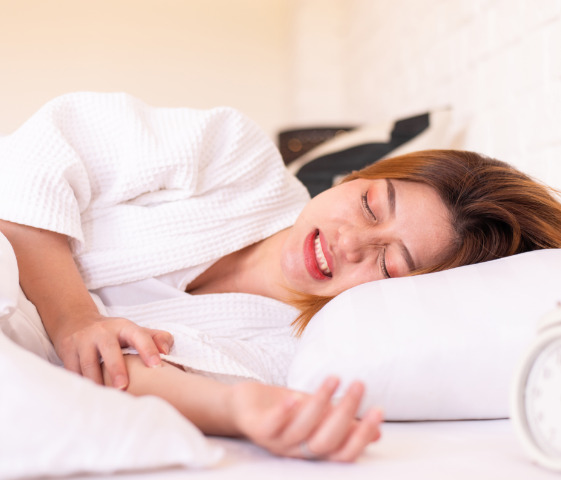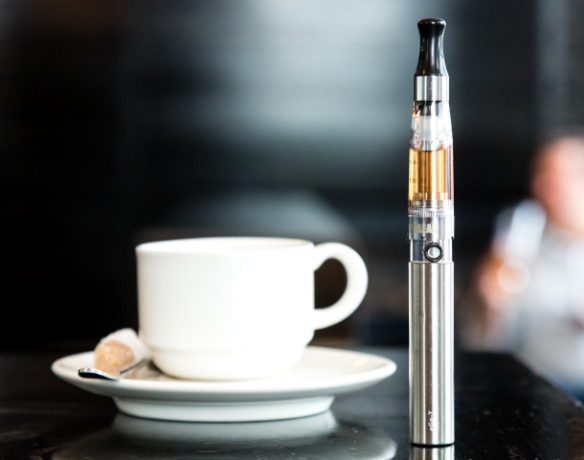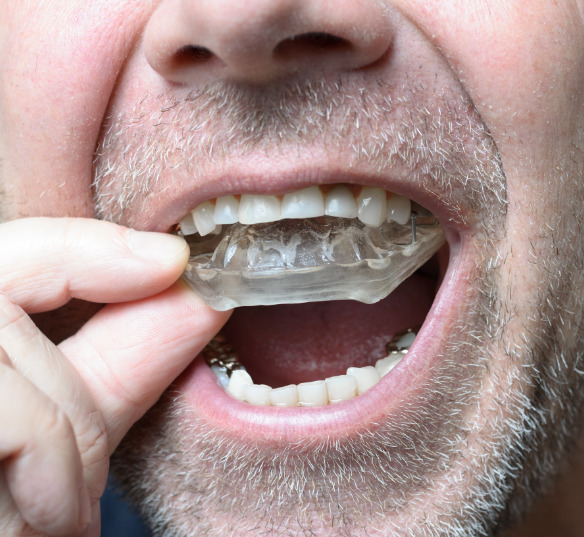Preventing Bruxism:
What You Need to Know
How to Prevent Bruxism
Bruxism is a condition in which you often clench your teeth together or tapping and grinding them without even realizing it. It can be a symptom of a larger issue, such as stress or anxiety, or it can be a problem all on its own. If you are showing signs and symptoms of bruxism or if your dentist has mentioned that you have excessive tooth wear, it’s important to take steps to prevent further damage to your teeth and jaw.
What is Bruxism?

Symptoms and Signs of Bruxism
- Sleep partner can hear your teeth grinding and clenching at night. Maybe even woken up by it.
- Tooth enamel is so worn down that it exposes your tooth’s lower layers. Despite not being an ear issue, there is pain that feels like an earache.
- More sensitive teeth or even pain in them if the condition worsens. Loose, chipped, cracked, misaligned, or flattened teeth.
- Your jaw muscles might feel tighter or more tired. You could wake up with jaw pain and even a locked jaw in severe bruxism cases.
- Soreness can also extend to the face, with facial muscles just as strained as jaw muscles.
- Headache and temple pain.
- The tooth grinding might lead to accidental but constant chewing on the inside of your cheek, which can cause damage.
Causes of Bruxism
Physical
Psychological
Neurological Disorders
Medication Side Effects
Certain drugs and medications, from antidepressants to stimulants, can increase muscle tension and stress in the jaw. It is important to speak to a doctor if you are experiencing bruxism while taking any type of medication, as the cause may be related to the medication.
Lifestyle
Worth mentioning that recreational drugs, caffeine, and alcohol are stimulants that can disrupt sleep an
Sleep apnea

Diagnosis
How to Prevent Bruxism
The best way to prevent bruxism is to identify and address the underlying causes. Several of the factors for sleep bruxism can be prevented once you’re diagnosed or realized you’re one of the world’s millions of patients with sleep bruxism.
Stress and Anxiety Management
As we’ve mentioned, emotional issues like chronic stress and anxiety can result in, or worsen, bruxism. Identifying triggers, such as grinding teeth during anxious moments, and avoiding them can also be helpful. Additionally, following good oral hygiene habits, such as brushing and flossing regularly and visiting the dentist regularly, can help reduce the risk of bruxism.
Regular Dentist Visits
Regular dental checkups can help them or any healthcare provider detect signs of bruxism before they cause severe dental issues. They will compare bite marks from previous sessions and notice any wear and tear related to tooth grinding and clenching.
Lifestyle changes
Among the top prevention measures is to limit or avoid the consumption of caffeine (found in coffee, tea, and certain sodas), as well as alcohol and any other stimulant drugs, as these substances can lead to or aggravate bruxism.
Jaw Exercises and Massages
Relaxation Techniques
You can also try yoga, and relaxation techniques can help reduce stress and tension, which can help prevent bruxism. A big help for many is a warm bath or shower before sleeping, as it helps them relax and sleep better, contributing to their overall health and not just preventing bruxism.

Night guards as prevention
Treatment of Bruxism
While exercises that help relax the jaw muscles can be helpful in cases of mild bruxism, as can therapy to address the underlying emotional issues, more severe cases might need more comprehensive treatment options.
There are pain medications, and mouth guards can be used to help reduce pain and protect the teeth from further damage, while muscle relaxants can be used to stop the muscle activity that leads to clenching during the day or night. A dentist might also be required to change the chewing surfaces of your teeth or use a crown and other procedures to repair severe damage, like cracking and loss of teeth.
Don't Ignore Bruxism Symptoms
Bruxism is a complex condition, but luckily there are several approaches to deal with it. Night guards, medication, and even a warm bath may be part of the answer. You may even be able to make slight adjustments to your nightly habits or try a jaw massage. Don’t wait to get help if you or someone you know is experiencing any symptoms of bruxism. Make an appointment with a dentist or medical professional, or healthcare provider right away to get a proper diagnosis, stop any complications from getting worse, and start the journey to improved dental and overall health. Taking action as soon as possible is key to managing bruxism and ensuring your well-being.

